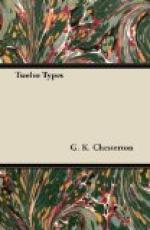the essential spirit of youth, than when they are
sitting gloomily in the presence of immemorial destiny.
The great error consists in supposing that poetry is
an unnatural form of language. We should all
like to speak poetry at the moment when we truly live,
and if we do not speak it, it is because we have an
impediment in our speech. It is not song that
is the narrow or artificial thing, it is conversation
that is a broken and stammering attempt at song.
When we see men in a spiritual extravaganza, like
Cyrano de Bergerac, speaking in rhyme, it is not our
language disguised or distorted, but our language
rounded and made whole. Rhymes answer each other
as the sexes in flowers and in humanity answer each
other. Men do not speak so, it is true.
Even when they are inspired or in love they talk inanities.
But the poetic comedy does not misrepresent the speech
one half so much, as the speech misrepresents the soul.
Monsieur Rostand showed even more than his usual insight
when he called ’Cyrano de Bergerac’ a
comedy, despite the fact that, strictly speaking, it
ends with disappointment and death. The essence
of tragedy is a spiritual breakdown or decline, and
in the great French play the spiritual sentiment mounts
unceasingly until the last line. It is not the
facts themselves, but our feeling about them, that
makes tragedy and comedy, and death is more joyful
in Rostand than life in Maeterlinck. The same
apparent contradiction holds good in the case of the
drama of ‘L’Aiglon,’ now being performed
with so much success. Although the hero is a
weakling, the subject a fiasco, the end a premature
death and a personal disillusionment, yet, in spite
of this theme, which might have been chosen for its
depressing qualities, the unconquerable paean of the
praise of things, the ungovernable gaiety of the poet’s
song swells so high that at the end it seems to drown
all the weak voices of the characters in one crashing
chorus of great things and great men. A multitude
of mottoes might be taken from the play to indicate
and illustrate, not only its own spirit, but much
of the spirit of modern life. When in the vision
of the field of Wagram the horrible voices of the
wounded cry out, ‘Les corbeaux, les corbeaux,’
the Duke, overwhelmed with a nightmare of hideous
trivialities, cries out, ’Ou, ou sont les aigles?’
That antithesis might stand alone as an invocation
at the beginning of the twentieth century to the spirit
of heroic comedy. When an ex-General of Napoleon
is asked his reason for having betrayed the Emperor,
he replies, ‘La fatigue,’ and at that a
veteran private of the Great Army rushes forward,
and crying passionately, ‘Et nous?’ pours
out a terrible description of the life lived by the
common soldier. To-day when pessimism is almost
as much a symbol of wealth and fashion as jewels or
cigars, when the pampered heirs of the ages can sum
up life in few other words but ‘la fatigue,’
there might surely come a cry from the vast mass of
common humanity from the beginning ‘et nous?’




